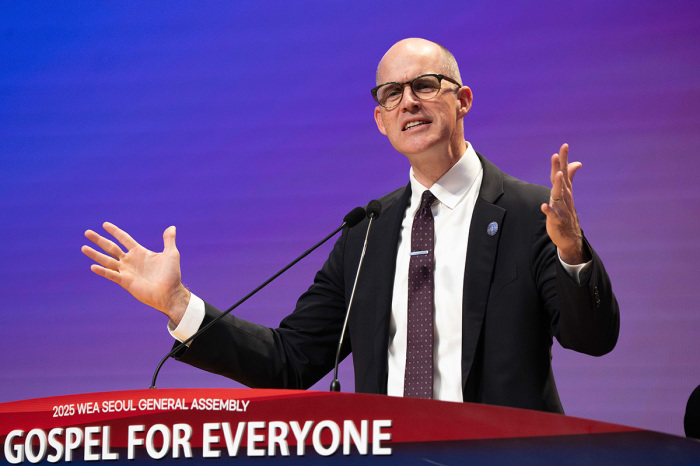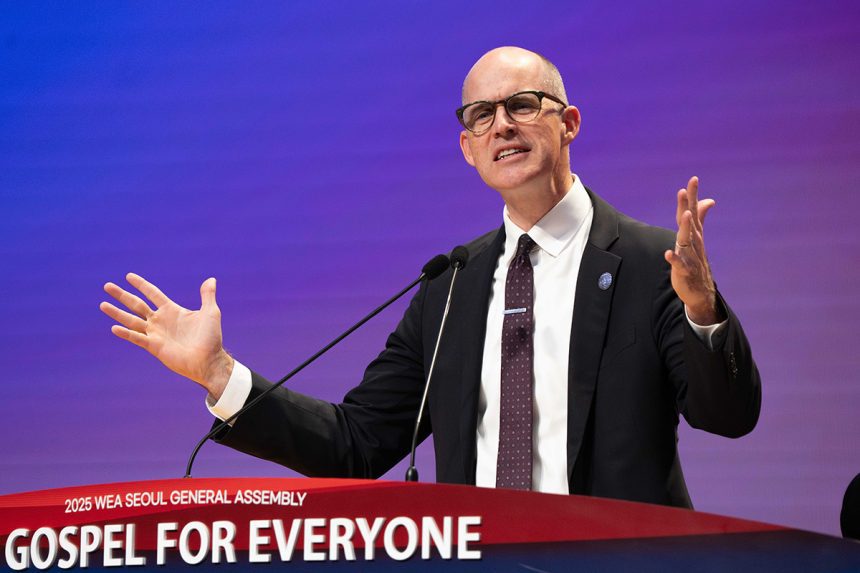
SEOUL, South Korea — Kevin Brown, president of Asbury University, says his prayer is that in five to 10 years, Christians will look back on the Asbury revival as a tremor that preceded a global Christian awakening.
In February 2023, what seemed like a “routine chapel service” turned into a 16-day revival that drew 15,000 people from across the world to the small town of Wilmore, Kentucky, among them students from 287 different universities, Brown told delegates gathered on the second day of the World Evangelical Alliance’s General Assembly.
“But in the time since the outpouring, my prayer has been that in five, seven, 10 years, we would look back on what we saw in February of 2023 and say that it was nothing. That the outpouring would be seen as a mere tremor preceding an earthquake of holy Christian awakening across our globe,” Brown said, describing it as the most incredible experience of his lifetime.
The outpouring of the Holy Spirit was a “powerful, truly a historically special moment for Asbury and our students,” Brown added. And he’s been following the movement ever since.
“Over the last two-and-a-half-years, I have been especially encouraged by a renewal of stirred spiritual fervor, both in the United States and abroad,” he said, listing numerous mass baptisms and global worship gatherings, including Gather 25, Baptize California, Baptize America and the Unite US movement, among others.
“In January of 2024, 55,000 college students filled a football stadium in Atlanta, Georgia, for a multi-day worship gathering,” Brown shared with the global audience. “In September of this year, the Baptize America initiative had over 650 churches participate and reported 30,000 baptisms. And we continue to see broader trends of increasing belief in America.
“According to this year’s religious landscape survey, the decline of Christianity in the United States has slowed and may have even leveled up. There’s been an increase in the percentage of adults who say they made a personal commitment to Jesus that remains important. And millennial generations are attending church with greater regularity,” he continued.
“That is a reversal of previous trends. And according to the American Bible Society’s 2025 report, 10 million more Americans have identified themselves as Bible readers. That’s the highest number in the last four years.”
The number of people opening their Bibles and attending church is also exploding in Europe and the U.K., where people are seeing signs of a “quiet revival,” he added, sharing that church attendance has “increased over 50 percent in England and Wales between 2018 and 2024.”
And in September of last year, Brown said he was “shaken, stirred and amazed” to see the “visible heartbeat for renewal, revival and awakening” at the Lausanne Global Congress in Incheon, attended by over 5,000 Christians from over 200 countries to worship “in one accord, unified in a shared vision and passion for Christ and for spirit-led mission.”
Brown said he’s heard countless inspirational stories of “renewal and awakening” in Africa, New Zealand, China, India and other countries, particularly among younger generations.
But are these events indicators of a global Christian revival?
To answer that question, Brown directed Christians to the story of the blind beggar in John 9.
“Jesus was asked, ‘Who sinned, him or his parents, to cause his blindness?’ After Jesus miraculously healed the man of his blindness, the Pharisees summoned the beggar, interrogated him, and asked for his own testimony about who Jesus is and whether Jesus was a sinner.
“Recall his answer, ‘Whether or not he is a sinner, I do not know. Here’s what I do know. I was blind and now I can see.’”
Brown said he cannot answer whether the world is seeing a Christian revival. But what he does know is that back in 2023, he witnessed “50,000 hungry-hearted people seeking Jesus in Asbury,” and he’s still seeing that same stirring among people of all nations.
He then posed the question, “How would we know we have had a revival?”
The answer: unity. Not uniformity, he clarified, but the unity described in the Bible and by Christian leaders throughout history.
Paul emphasized unity in his letters to the churches during his first imprisonment in Rome, as seen in Philippians 2 and Ephesians 4. Also, Proverbs 6:16-19 lists discord as among the things God hates, Brown added.
“And of course, one of the most powerful appeals to unity comes from Christ Himself. In John 17, Jesus prayed for unity.”
“The unity Jesus prayed for is not simply respecting differences. It’s not simply serving alongside one another. It is not simply intellectually ascending to share tenets of the faith,” he insisted. “When Jesus prayed for unity, He was praying for something more; something different.”
Brown emphasized that the unity among Christians is meant to “pattern the unity between Christ and God the Father.”
“The same self-giving reciprocal union in the Trinity. This is a heart matter. An allegiance to God that supersedes every other allegiance. Burning, holy love. Christ envisions oneness as unity of heart and spirit,” he added.
“Jesus prays for all believers that they may be one because we are one.”
The WEA’s 14th General Assembly, held on Oct. 27-31, features speeches by global church leaders, including world-renowned evangelists Stephen Tong and Rick Warren, along with panel topics ranging from global persecution and abortion to AI, church growth, and the importance of disability ministries that are saving the lives of people too often overlooked and underserved.
The event has gathered 850 delegates from 124 countries, along with over 4,000 Korean pastors, making it one of the most globally diverse gatherings in the Evangelical movement.
Follow Melissa Barnhart on X: @MelBarnhart







